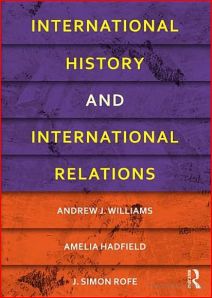The below review is by Terry Barringer, co-editor of The Round Table, and appeared in said journal, Vol. 102, Issue 6 2013, p. 582. One of the co-editors is Canterbury Politics and IR Programme Senior Lecturer Dr. Amelia Hadfield. Such a glowing review that emphasises the student friendliness of the textbook is indicative of the focus on teaching and the student experience here in the Politics and IR programme. More exciting news on student textbooks will be coming from the Programme soon!
International History and International Relations
Andrew J. Williams, Amelia Hadfield and J. Simon Rofe
London and New York, Routledge, 2012, pp.vi + 252, ISBN 9780415481786 (hardback), 9780415481793 (paperback), 9780203119907(ebk).
It is a pleasure to welcome this student textbook from a trio of authors, two of them closely connected with The Round Table. It was conceived and gestated as they taught together a successful undergraduate course at the University of Kent and is designed for I[nternational] R[elations] novices ‘who need some history’. As a historian who needs some IR, I found it equally useful and, as I was reading it, while following media coverage of the debates and decisions over intervention in Syria, it was a good prophylactic against woolly thinking, specious arguments and inflated rhetoric.
The book is arranged thematically in seven sections: History and International relations, War, Peace, Sovereignty, Empire, International Organization and Identity. It is a collaborative work and the authors do not disclose which of them is responsible for which sections (although it is not too difficult to guess). In the way of today’s textbooks, the main text is broken up by ‘boxes’ with handy definitions, summaries or case studies. I would have appreciated a few more of these to help navigation through the waves of IR theory.
There is a 40 page bibliography, which in addition to canonical IR texts includes historians from Herodotus to Niall Ferguson by way of Gibbon and a number of works of fiction. In addition some chapters have their own suggestions for further reading and lists of useful websites.
My favourite chapter, and I suspect this preference will be shared by most Round Tablers, is that on ‘Empire’. As is only to be expected there is judicious treatment of the British Empire and its dissolution with mention of the Commonwealth. ‘On the positive side we can point to the idea of the ending of empire leading to the creation of a freedom-asserting ‘Commonwealth’. Although the chapter speaks of ‘a sadly shrunken institutional structure’ and ‘a worthy but ineffective shadow of its former self’ there is acknowledgement of the Commonwealth’s ‘ lasting legacy of local institutional democratic traditions’ (p.137). Other Empires touched upon are those of Rome, Byzantium, Soviet Russia, Nazi Germany, the United States and (unusually and interestingly) the Mongols. The author asks why empires rise and why they decline (and sometimes revive again) and whether Empire is invariably to be regarded as ‘a bad thing’. There are some quirky comparative points such as olive oil as the coca-cola of the late Roman world.
I wish there had been textbooks like this around when I was a student!
 Politics
Politics Anna Vanaga
Anna Vanaga 534
534


